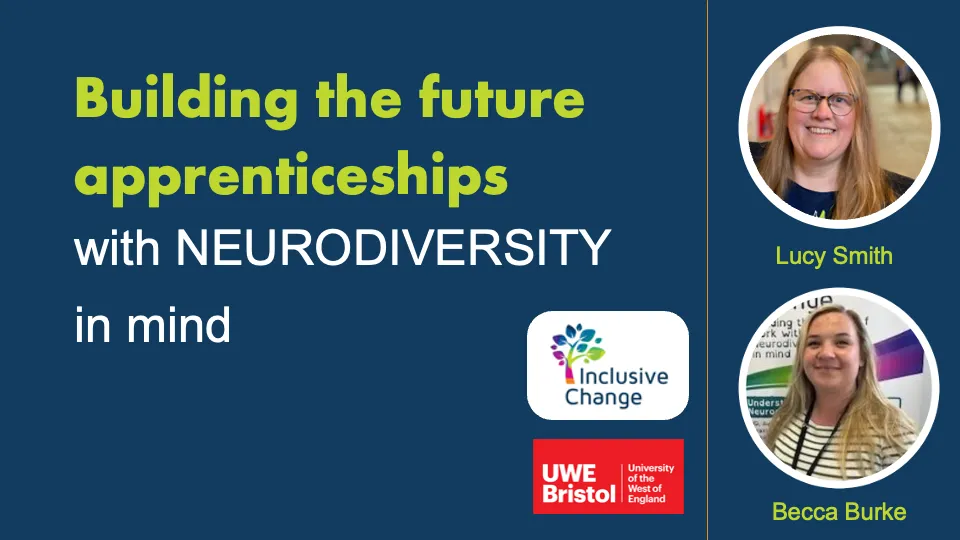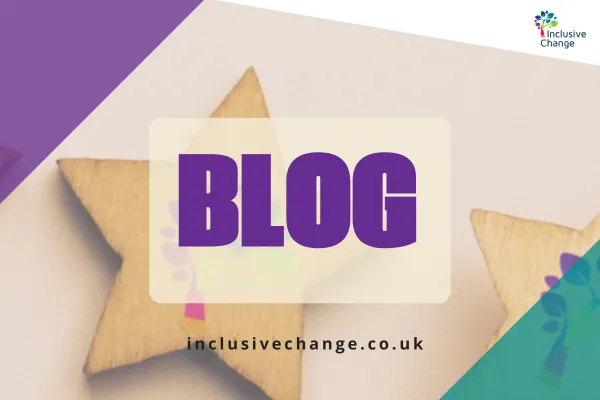
Creating Better Experiences for Neurodivergent Apprentices, Lessons from UWE Bristol
UWE Apprenticeship Employer Workshop: Building the Future of Apprenticeships with Neurodiversity in Mind
In May, we had the pleasure of joining the UWE Apprenticeship team to deliver a workshop for employers to better support neurodivergent apprentices in the workplace. This workshop formed part of UWE’s ongoing work to strengthen the support available to apprentices across sectors. Fifty employers joined us for the event, which underlined the appetite for practical, real world guidance. It was an incredibly humbling experience and amazing to see so much engagement and interest in wanting to create a better experience for the students.
At Inclusive Change, our work is rooted in collaboration, and this session was no exception. Together with the UWE team, we delivered our workshop to reflect the real challenges and opportunities employers and apprentices face. We know that creating inclusive environments doesn’t happen overnight; it takes planning, reflection, and a willingness to listen and learn from everyone involved.
We explored how terminology is shifting as understanding grows, and how important it is for employers to stay responsive rather than rely on outdated labels. We looked at identity first vs person first language. At how terms like 'neurodivergent,' 'AuDHD,' and 'neurotypical' are being used, Lucy and I shared our lived experience of this. It is my preference to use identity-first language (e.g. I am an ADHDer rather than someone with ADHD). It’s important to use language that the person you’re speaking to feel comfortable with, so checking in with them is always the best.
We touched on the legal side of things, particularly the Equality Act 2010, and how reasonable adjustments can and should be made without the need for a formal diagnosis.
Disclosure remains a sticking point for many apprentices, often because they worry about how they may be perceived or whether it will affect opportunities. Many apprentices choose not to share their needs for fear of judgment or being treated differently. Some will disclose to their education provider, but not to their employer due to anticipated stigma. We shared some key statistics that demonstrate this, and how it is important to create spaces where people feel safe and supported from the start.
We shared real world, headline case studies, outlining how simple workplace adjustments can avoid enormous repercussions and costs in employer tribunal pay-outs in the long term. Alongside unnecessary distress for those involved. Recent figures show a 13% rise in employment tribunal claims from April 2023 to Match 2024 (HM courts & Tribunals Service), a clear indication that many disabled employees are still not receiving the support they need.

Key takeaways from the event:
Inclusion isn't something you do once and tick off a list. It’s a continuous process.
Starting conversations early, being flexible in how we assess skills, and making small but meaningful adjustments can have a big impact.
Employers don’t need to figure this out alone. There’s support available, whether through training, audits, or consultancy.
Lived experience, empathy, and psychological safety should be at the heart of workplace culture.
The session closed with a shared commitment to keep building on what we discussed.
“Thank you to everyone for being involved in this event. We value the feedback”
“Huge thanks to Lucy and Becca for delivering such a practical and insightful workshop on neurodiversity. Their use of real-life examples helped bring the topic to life and deepened our understanding of how to support neurodiverse apprentices in the workplace.”
“It was fantastic to see so many employers actively engaging throughout the session. A sign that there’s growing momentum behind building more inclusive, supportive environments for all.”
To everyone who came along, asked thoughtful questions, and shared their insights, thank you. We really appreciated how interactive and engaged the session was due to your participation.
If your organisation is ready to strengthen its approach, you are welcome to get in touch at [email protected] to explore our Neurodiversity Awareness training.
